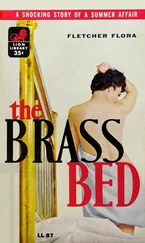Флетчер Флора - Strange Sisters
Здесь есть возможность читать онлайн «Флетчер Флора - Strange Sisters» весь текст электронной книги совершенно бесплатно (целиком полную версию без сокращений). В некоторых случаях можно слушать аудио, скачать через торрент в формате fb2 и присутствует краткое содержание. Город: New York, Год выпуска: 1954, Издательство: Lion Books, Жанр: Эротические любовные романы, на английском языке. Описание произведения, (предисловие) а так же отзывы посетителей доступны на портале библиотеки ЛибКат.
- Название:Strange Sisters
- Автор:
- Издательство:Lion Books
- Жанр:
- Год:1954
- Город:New York
- ISBN:нет данных
- Рейтинг книги:4 / 5. Голосов: 1
-
Избранное:Добавить в избранное
- Отзывы:
-
Ваша оценка:
- 80
- 1
- 2
- 3
- 4
- 5
Strange Sisters: краткое содержание, описание и аннотация
Предлагаем к чтению аннотацию, описание, краткое содержание или предисловие (зависит от того, что написал сам автор книги «Strange Sisters»). Если вы не нашли необходимую информацию о книге — напишите в комментариях, мы постараемся отыскать её.
Here is the story of a lesbian, and of the devastating crime to which she was driven when she tried to disavow her body’s urgings. Here is a shattering theme, treated with rare sensitivity and power.
Strange Sisters — читать онлайн бесплатно полную книгу (весь текст) целиком
Ниже представлен текст книги, разбитый по страницам. Система сохранения места последней прочитанной страницы, позволяет с удобством читать онлайн бесплатно книгу «Strange Sisters», без необходимости каждый раз заново искать на чём Вы остановились. Поставьте закладку, и сможете в любой момент перейти на страницу, на которой закончили чтение.
Интервал:
Закладка:
No judgment against Ridley, no indictment. Praise, rather, in those days when a moratorium had been declared on the Sixth Commandment. The warm, effusive approval and commendation of comrades. And worst of all, worst now in dark retrospect, that cruel and singing exaltation in his own heart.
Yes, it’s a long, long way from a mouse to a man, and sometime along the way, somehow, comes the tough resiliency, the ability to cope on even terms. But the old self is never lost. It recedes in one time only to reassert itself in another, and James Ridley stirred uneasily behind his desk and repeated bitterly that he was only an agent, that he was only doing a job.
He was very tired. He had been busy most of the night, and the rest of the night he had sat at his desk and gathered in his mind loose threads of inference and suggestion and odds and ends of fact, and it had all started because a girl who had drunk too much had referred to a poem. He cursed himself for his familiarity with the lines, wished to God that he had never read them, but once he had heard them from Sergeant Tromp and understood their significance in relation to the girl and to the man she had surely killed, there was nothing to do but to go ahead along the line suggested. So he had walked the streets, had visited places he knew, and because a girl cannot live a certain kind of life in one city for several years without leaving here and there circumstantial evidence of the kind of life she lived, he had learned a great deal. Nothing definitive, nothing that actually proved anything, certainly not murder, but sufficient to make him understand the kind of person Kathy Gait was and to make him understand why, under certain circumstances, she might kill a man. What bothered him most was why she had placed herself in those circumstances. He thought he understood that, too, and it bothered him. It made him feel for her a great pity.
Chapter 11
Released in a status of precarious reprieve under a threat that had refined itself to the point of official observation, she walked the streets without objective and came after a while to the bank of a river. She stood at the crest of the brick embankment and looked down at the activity on the gray, sluggish water. A barge drifted past. A group of men were doing something with boxes and bales at the end of a rough plank pier. To her left, heavy and black and parallel to the water’s surface, a railroad bridge spanned the stream. To her right, a more delicate structure, a bridge for automobiles and pedestrians lifted its slender steel spine in a high and graceful arc. Turning in that direction, she walked along the crest of the brick embankment to the rising approach to the bridge. Passing a sign that said no loitering, she ascended the arc of the bridge to its highest point and stood there looking down, and pretty soon there were some words in her mind, and the words were: Even the weariest river winds somewhere safe to sea.
Phrases like that were often very nice and expressive. They had a strong, vivid sound. It was nice and very peaceful to stand there on the bridge and let the words drift slowly through her mind as if they were part of the river itself.
There were some other words that went ahead, if only she could think of them. She tried hard to remember, more because it gave her mind something to do that was free from painful consequences than because she really wanted to know what the words were, but she was unsuccessful. If she could remember the name of the man who had written the words, she thought, perhaps it would help her to remember the words themselves. She thought maybe it was Shelley, though she doubted it very strongly, and she was considering it seriously, whether or not it was Shelley, when some of the words returned with a little rush and were right there in her mind in proper sequence all at once: From too much love of living, from hope and fear set free...
Now, however, it was worse than ever, because there was a gap. Between remembered words there were words unremembered, and she found that very disturbing. Unable to fill the gap, she thought that it might be just as good to put all the remembered words together, thus acquiring by a kind of trickery an effect of completion, and though she found that she could make an appropriate rhyme this way, there was still something obviously missing, something-gone from the middle.
The river flowed toward her and under her and away from her to the sea, and the river was life, and the sea was death. What would it be like to die? Not to be dead, but to die. The actual brief and terrible termination of breathing and thinking and pumping blood. There was a scrap of poetry for that, too, a little rag of words in her mind, as there had been so often for the many bad things.
Be it Paris or Helen dying, Who dies soever, dies in pain...
Was that true? Was it final and climactic pain, worse by far in its flashing brevity than all the pain of all the years before? Or was it really no more than a quiet quitting, a gentle cessation of essential functions? How would it be, for instance, to drop into the gray water below, to pass with the river into the sea? She had read somewhere that drowning was actually not an unpleasant way to die. The thing to remember was not to become terrified, not to fight the work of the water. Passive was the word. You had to be passive. It was that way about many things, not only the final thing of dying. Much that had been bad would have been better, a little less bad, if only you could have been passive.
The river was life, and the sea was death, and the river eventually reached the sea, because even the weariest river reaches the sea, but before it did, it touched many places, and one of the places it touched was the campus of Burlington College. The river valley there was wide and flat, and the river was shallow between low banks, and you could see the sun glinting on the water from a window in the office of the dean. You could sit in an uncomfortable chair with a high, hard back in the musty office that had the smell of old books, and you could see a long way through the window and down a gentle slope between wide-spaced oaks and maples and elms to a pale fringe of willows and the glinting water.
The dean’s voice was a dull, meandering thread in the bright fabric of quiet. It disturbed the peace and molested the ear drums, but it was possible to ignore it almost completely because it was, after all, saying nothing that was any particular help in a matter that was past helping. It was possible to ignore it, that is, until it ceased altogether, and then, by its very absence, it demanded some measure of attention, a concession of a sort.
Reluctantly, Kathy turned her face from the window and said, “I’m sorry. I’m afraid I didn’t hear.”
The dean’s heavy face betrayed a trace of irritation that was immediately and professionally expunged. She had a quite obvious mustache of fine hairs. There was a mole on her chin with three similar hairs growing from it, and there > was a second mole in the crevice between her right nostril and cheek. No hairs grew from the second mole. She had a wide mouth that compressed thinly in sudden anger and relaxed as suddenly when she remembered in time that it was not appropriate for deans to display anger.
She said with labored patience, “I was saying that I’m at a loss to understand your miserable showing, Kathryn. With the exception of Dr. Telsa’s class, you failed to make a single passing mark. It’s incredible.”
“I’m sorry.”
“So am I. Very sorry. But I’m afraid that regret is not sufficient to change the record. Have you anything to say for yourself? Any reasonable explanation at all? Have you been feeling ill? Has anything been troubling you?”
Kathy looked out the window again, and there were no leaves on the trees, but there was on the branches a thin veneer of shining ice, and there was ice floating in the river beyond the willows. It was a January day with the soiled winter clouds cleared for a while from the low sky, a brief, bright interim that would not last, and it was no time to waste on a dull woman who asked interminable questions that never approached the truth. There was no way to explain, no use in the world of trying to explain that the mind obsessed and absorbed cannot be parceled out to lesser tasks and interests like so much hired help.
Читать дальшеИнтервал:
Закладка:
Похожие книги на «Strange Sisters»
Представляем Вашему вниманию похожие книги на «Strange Sisters» списком для выбора. Мы отобрали схожую по названию и смыслу литературу в надежде предоставить читателям больше вариантов отыскать новые, интересные, ещё непрочитанные произведения.
Обсуждение, отзывы о книге «Strange Sisters» и просто собственные мнения читателей. Оставьте ваши комментарии, напишите, что Вы думаете о произведении, его смысле или главных героях. Укажите что конкретно понравилось, а что нет, и почему Вы так считаете.











